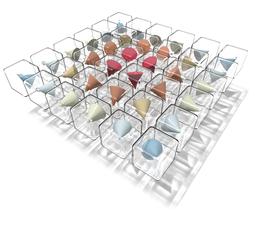The Skyrmion Project
- Homepage
- https://www.skyrmions.ac.uk/
- Started
- 22nd July 2016
- Research Team
- Marijan Beg
- Investigators
- Hans Fangohr
Tony Skyrme proposed that under special circumstances it is possible to stabilize vortex-like whirls in fields to produce topologically stable objects. This idea, effectively of creating a new type of fundamental particle, has been realised with the recent discovery of skyrmions in magnetic materials. The confirmation of the existence of skyrmions in chiral magnets and of their self-organization into a skyrmion lattice has made skyrmion physics arguably the hottest topic in magnetism research at the moment. Skyrmions are excitations of matter whose occurrence and collective properties are mysterious, but which hold promise for advancing our basic understanding of matter and also for technological deployment as highly efficient memory elements. Following the discovery of skyrmions in a variety of materials, several urgent questions remain which are holding back the field: what are the general properties of the phase transitions that lead to the skyrmion lattice phase, the nature of its structure, excitations and stability and how might we exploit the unique magnetic properties of this matter in future devices? These questions have only recently begun to be addressed by several large international consortia and are far from being resolved. For the UK to contend in this highly competitive field a major project is required that brings together UK experts in materials synthesis and state-of-the-art theoretical and experimental techniques. Our systematic approach, combining experts from different fields is aimed at answering basic questions about the status of magnetic skyrmions and working with industrial partners to develop technological applications founded on this physics.
Acknowledgements
This work is financially supported by the EPSRC’s Programme Grant EP/N032128/1. We also acknowledge the use of the IRIDIS High Performance Computing Facility, and associated support services at the University of Southampton.
